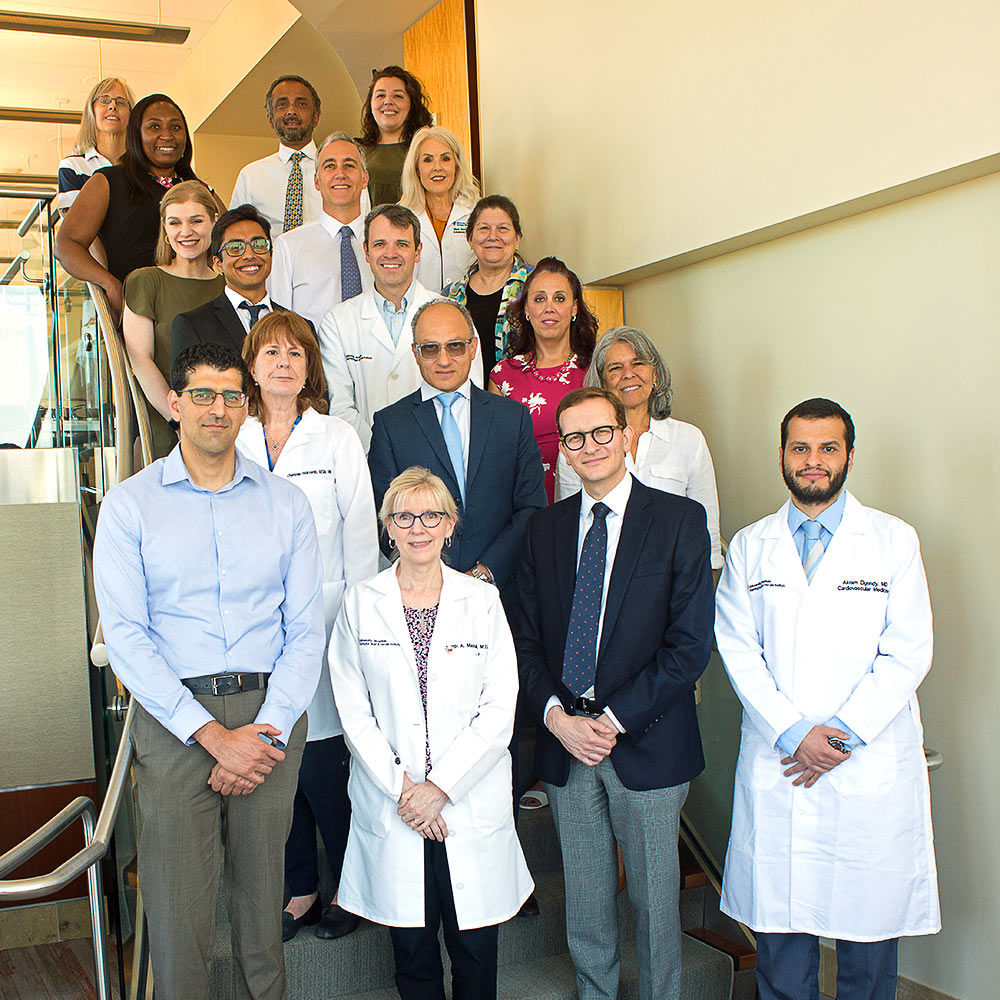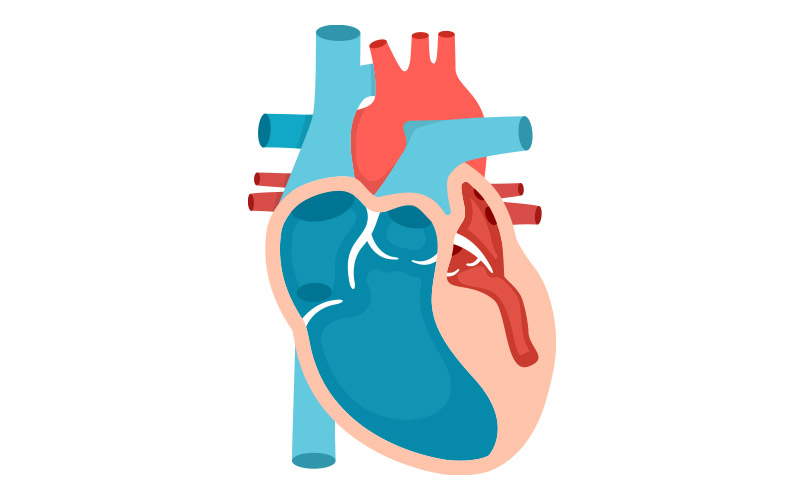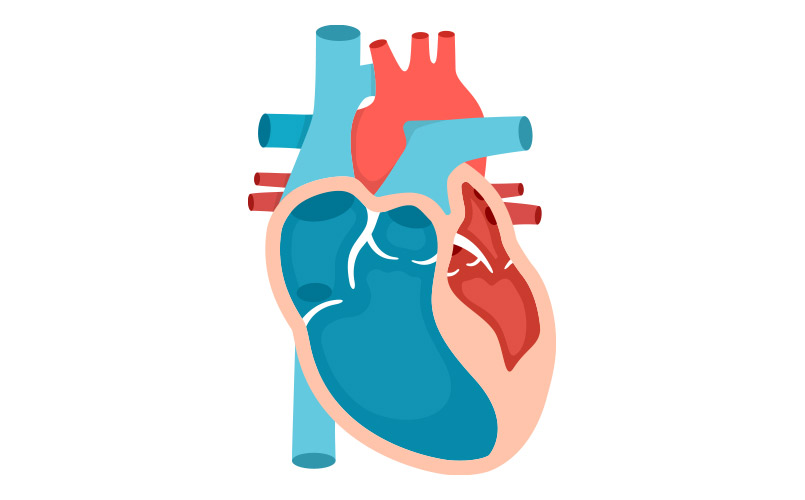Hypertrophic Cardiomyopathy
Understanding the intricate complexities involved in the diagnosis and treatment of patients with hypertrophic cardiomyopathy (HCM), the experts at University Hospitals Harrington Heart & Vascular Institute have developed a unique and effective approach to care that maximizes the input of different medical and surgical disciplines through a highly specialized, shared decision-making HCM board. This enables our team to provide the most advanced care with the best clinical outcomes.
Make an Appointment
Call 216-286-4426 or email HCM@UHhospitals.org to schedule with an HCM specialist.
Find a hypertrophic cardiomyopathy specialistWhat Is Hypertrophic Cardiomyopathy?

At University Hospitals Harrington Heart & Vascular Institute, patients with hypertrophic cardiomyopathy (HCM) are managed by diverse medical and surgical disciplines who are all synced into one highly specialized HCM board for the best patient outcomes.
Hypertrophic cardiomyopathy (HCM) is a disease in which the muscle of the heart’s main pumping chamber (the left ventricle) becomes abnormally thick (hypertrophy). This thickening can shrink the size of the pumping chamber and cause the heart to become stiff. As a result, a heart affected by HCM must work harder than normal and may have difficulty pumping oxygen-rich blood out to the rest of the body.
Hypertrophic cardiomyopathy is the most commonly inherited heart condition, affecting about one in 500 people. Many individuals living with the disease don’t know they have it and remain undiagnosed. Although most individuals with HCM can live normal lives, the condition can be serious and even life-threatening for some people.
HCM is most often caused by abnormal genes. The condition usually affects the muscular wall (septum) that separates the two bottom chambers (ventricles) of the heart. HCM can cause:
- Outflow tract obstruction: The thickened septum can result in a narrowing that blocks or reduces blood flow from the left ventricle to the aorta. As a result, the ventricles must pump harder to overcome the blockage.
- Left ventricular stiffness: Stiffness of the left ventricle makes it harder for the heart to relax, reducing the amount of oxygen-rich blood the ventricle can hold and deliver to the organs and muscles of body.
- Mitral valve changes: The mitral valve is one of the four heart valves that keep blood flowing in the correct direction. The valve is located between the two left heart chambers (left atrium and left ventricle). In people with HCM, the mitral valve may strike the thickened septum and cause blood to leak back into the left atrium.
- Cellular changes in the heart muscle: People with HCM have a rearrangement of heart muscle cells. This cellular misalignment can trigger abnormal heart rhythms in some people.
Types of Hypertrophic Cardiomyopathy
There are two types of HCM:

Obstructive HCM (OHCM)
Also called hypertrophic obstructive cardiomyopathy (HOCM), this type of HCM occurs when the enlarged septum blocks blood from flowing freely out of the heart to the body (outflow tract obstruction). OHCM accounts for two-thirds of diagnosed cases.

Nonobstructive HCM (NHCM)
In nonobstructive HCM, the septum is thickened but does not block blood from flowing out of the heart. However, in nonobstructive HCM, the left ventricle can stiffen, making it harder for the heart to relax while reducing the amount of blood the ventricle can hold and deliver to the body. NHCM accounts for one third of diagnosed cases.
Hypertrophic Cardiomyopathy Symptoms
People with HCM may experience many symptoms or none at all. Common symptoms of HCM include:
- Chest pain
- Shortness of breath and fatigue, especially with exertion
- Fainting or passing out (syncope)
- Heart murmur (whooshing sound between heartbeats that can be detected with a stethoscope)
- Sensation of fast, fluttering or pounding heartbeats (palpitations)
- Abnormal heartbeat (arrhythmia)
- Swelling in the ankles, feet, legs, abdomen or neck
If Left Untreated, What Can Happen to Someone With HCM?
Depending on the severity of the condition, a person with untreated HCM may eventually experience a stroke from atrial fibrillation, develop heart failure, require a heart transplant or experience sudden cardiac death (SCD).
HCM Patient Returns to Hiking the Appalachian Trail
Just a few months after open-heart surgery, Stuart O. Smith, Jr. has his stamina and strength back – and is living his life to the fullest, doing the activities he loves.
Hypertrophic Cardiomyopathy (HCM) – The Most Common Inherited Heart Condition
Hypertrophic cardiomyopathy (HCM) is the most common inherited heart condition, affecting about one in 500 people. However, up to 85% of individuals living with the disease don’t know they have it.
Hypertrophic Cardiomyopathy Diagnosis
If your healthcare provider suspects you have HCM, they will examine you and ask questions about your symptoms, your medical history and your family’s medical history.
Tests your healthcare provider may order to assist in the diagnosis of HCM include:
- Echocardiogram (echo): Used to show any thickening of the heart muscle, an echo utilizes sound waves to evaluate heart anatomy, heart valve function and blood flow through the heart.
- Electrocardiogram (ECG): This test records the electrical activity of the heart. An ECG can detect irregular heart rhythms and signs of heart thickening.
- Chest X-ray: Chest x-rays can detect abnormalities in the size and shape of the heart.
- Exercise stress echo test: During a stress test, your heart is monitored while you walk on a treadmill or ride a stationary bike. Exercise stress tests help show how your heart responds to physical activity.
- Cardiac magnetic resonance imaging (CMRI): A heart MRI is an imaging technique in which radio waves and magnets produce detailed images of the heart.
- Blood tests: Certain blood tests may be done to rule out other conditions.
- Event monitor: Worn for an extended period of time, this is used to assess any abnormal heart rate or rhythm.
Genetic Testing and Counseling for Hypertrophic Cardiomyopathy
If you have HCM, our cardiovascular genetic providers can identify the genes that may put your parents, siblings and/or children at risk for the condition. Then, we are able to help any affected family members get the care they need before they develop serious symptoms.
Hypertrophic Cardiomyopathy Treatment
You and your healthcare provider will discuss the best treatment for your HCM. The goal of treatment is to prevent or relieve symptoms and reduce risk of complications such as sudden cardiac death and heart failure. Individual treatment plans depend on the severity of symptoms and may include a combination of medications and procedures, as well as lifestyle changes and regular follow-up appointments with the HCM team.Medication
Certain medications are used to treat HCM by reducing how strongly the heart muscle squeezes and slowing the heart rate so that the heart can pump blood more efficiently. Medications used to treat HCM and its symptoms include:
- Beta blockers: Aids in decreasing the force of heart muscle contraction, decreases rapid or fast heart rate and improves symptoms; referred to as propranolol (Inderal, Innopran XL), atenolol (Tenormin), and metoprolol (Lopressor, Toprol-XL)
- Calcium channel blockers: Can be used alone or in combination with a beta blocker to slow cardiac conduction and heart muscle contraction; includes verapamil (Verelan, Calan SR) and diltiazem (Cardizem, Tiazac)
- Heart rhythm drugs: May be added to help alleviate persistent symptoms; includes disopyramide (Norpace) or amiodarone (Pacerone)
- Blood thinners: Known as warfarin (Jantoven), rivaroxaban (Xarelto), dabigatran (Pradaxa) and apixaban (Eliquis)
- Myosin inhibitors: First FDA approved targeted therapy to improve symptoms and exercise capabilities; referred to as Mavacamten (Camzyos)
Interventional and Surgical Procedures
Our Hypertrophic Cardiomyopathy Team
The multidisciplinary HCM board includes top rated specialists in cardiovascular medicine, cardiovascular imaging, electrophysiology, heart failure, cardiac surgery, cardiovascular genetics, interventional cardiology, maternal cardiology and pediatric cardiology. The board meets to formulate an individualized plan of care that is patient specific.
To schedule an appointment with any member of our hypertrophic cardiomyopathy team, please call 216-286-4426 or email HCM@UHhospitals.org.
Imran Rashid, MD
- Cardiology
-
Cleveland (0 mi.)
Beachwood (7 mi.)
Beachwood (7 mi.)
Judith Mackall, MD
- Cardiology, Cardiology-Clinical Cardiac Electrophysiology
-
Mentor (19 mi.)
Cleveland (0 mi.)
Euclid (7 mi.)
Beachwood (7 mi.)
Emily Massiello, LGC
- Genetic Counselor
-
Beachwood (7 mi.)
Cleveland (0 mi.)
Cleveland (0 mi.)
Cleveland (0 mi.)
Cleveland (0 mi.)
Cleveland (2 mi.)
Beachwood (5 mi.)
Mayfield Heights (7 mi.)
Richmond Heights (8 mi.)
Bedford (8 mi.)
Westlake (15 mi.)
Westlake (18 mi.)
Westlake (18 mi.)
Mentor (20 mi.)
Anna Mitchell, MD, PhD
- Pediatric Genetics
-
Cleveland (0 mi.)
Mayfield Heights (7 mi.)
Mayfield Heights (7 mi.)
Eiran Gorodeski, MD, MPH
- Cardiology-Heart Failure, Cardiology
-
Beachwood (7 mi.)
Cleveland (0 mi.)
Cleveland (0 mi.)
Beachwood (7 mi.)
Beachwood (7 mi.)
Mentor (19 mi.)
Chantal ElAmm, MD
- Cardiology, Cardiology-Heart Failure
-
Cleveland (0 mi.)
Cleveland (0 mi.)
Beachwood (7 mi.)
Beachwood (7 mi.)
Robert Montgomery, MD
- Cardiology-Heart Failure, Cardiology
-
Cleveland (0 mi.)
Cleveland (0 mi.)
South Euclid (4 mi.)
Beachwood (7 mi.)
Beachwood (7 mi.)
Beachwood (7 mi.)
Mentor (19 mi.)
Chardon (21 mi.)
Concord Twp (22 mi.)


